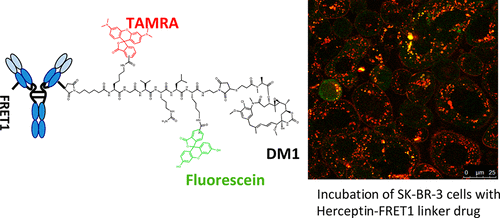当前位置:
X-MOL 学术
›
Bioconjugate Chem.
›
论文详情
Our official English website, www.x-mol.net, welcomes your
feedback! (Note: you will need to create a separate account there.)
FRET Reagent Reveals the Intracellular Processing of Peptide-Linked Antibody–Drug Conjugates
Bioconjugate Chemistry ( IF 4.0 ) Pub Date : 2018-06-01 00:00:00 , DOI: 10.1021/acs.bioconjchem.8b00362 Byoung-Chul Lee 1 , Cecile Chalouni 2 , Sophia Doll 1, 2 , Sam C. Nalle 3 , Martine Darwish 1 , Siao Ping Tsai 4 , Katherine R. Kozak 4 , Geoffrey Del-Rosario 5 , Shang-Fan Yu 5 , Hans Erickson 1 , Richard Vandlen 1
Bioconjugate Chemistry ( IF 4.0 ) Pub Date : 2018-06-01 00:00:00 , DOI: 10.1021/acs.bioconjchem.8b00362 Byoung-Chul Lee 1 , Cecile Chalouni 2 , Sophia Doll 1, 2 , Sam C. Nalle 3 , Martine Darwish 1 , Siao Ping Tsai 4 , Katherine R. Kozak 4 , Geoffrey Del-Rosario 5 , Shang-Fan Yu 5 , Hans Erickson 1 , Richard Vandlen 1
Affiliation

|
Despite the recent success of antibody–drug conjugates (ADCs) in cancer therapy, a detailed understanding of their entry, trafficking, and metabolism in cancer cells is limited. To gain further insight into the activation mechanism of ADCs, we incorporated fluorescence resonance energy transfer (FRET) reporter groups into the linker connecting the antibody to the drug and studied various aspects of intracellular ADC processing mechanisms. When comparing the trafficking of the antibody–FRET drug conjugates in various different model cells, we found that the cellular background plays an important role in how the antigen-mediated antibody is processed. Certain tumor cells showed limited cytosolic transport of the payload despite efficient linker cleavage. Our FRET assay provides a facile and robust assessment of intracellular ADC activation that may have significant implications for the future development of ADCs.
中文翻译:

FRET试剂揭示了肽连接的抗体-药物结合物的细胞内加工
尽管抗体药物偶联物(ADCs)在癌症治疗方面最近取得了成功,但是对它们在癌细胞中的进入,运输和代谢的详细了解仍然有限。为了进一步了解ADC的激活机制,我们将荧光共振能量转移(FRET)报告子基团整合到将抗体与药物连接的接头中,并研究了细胞内ADC处理机制的各个方面。当比较抗体-FRET药物偶联物在各种不同模型细胞中的运输时,我们发现细胞背景在抗原介导的抗体的加工方式中起着重要作用。尽管有效的接头裂解,某些肿瘤细胞仍显示出有效载荷的有限的胞质转运。
更新日期:2018-06-01
中文翻译:

FRET试剂揭示了肽连接的抗体-药物结合物的细胞内加工
尽管抗体药物偶联物(ADCs)在癌症治疗方面最近取得了成功,但是对它们在癌细胞中的进入,运输和代谢的详细了解仍然有限。为了进一步了解ADC的激活机制,我们将荧光共振能量转移(FRET)报告子基团整合到将抗体与药物连接的接头中,并研究了细胞内ADC处理机制的各个方面。当比较抗体-FRET药物偶联物在各种不同模型细胞中的运输时,我们发现细胞背景在抗原介导的抗体的加工方式中起着重要作用。尽管有效的接头裂解,某些肿瘤细胞仍显示出有效载荷的有限的胞质转运。











































 京公网安备 11010802027423号
京公网安备 11010802027423号